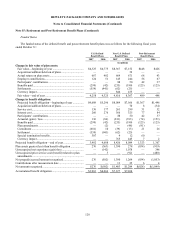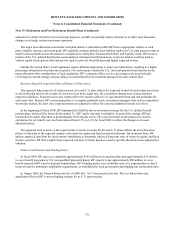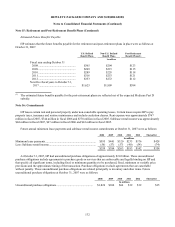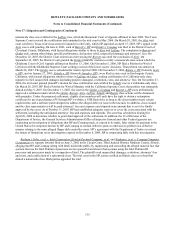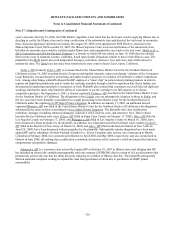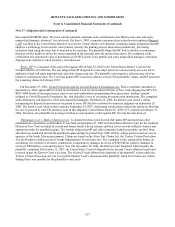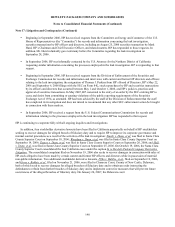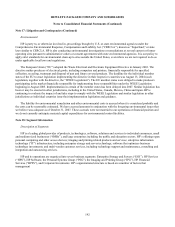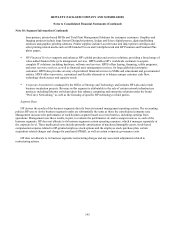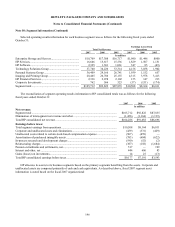HP 2007 Annual Report Download - page 151
Download and view the complete annual report
Please find page 151 of the 2007 HP annual report below. You can navigate through the pages in the report by either clicking on the pages listed below, or by using the keyword search tool below to find specific information within the annual report.
HEWLETT-PACKARD COMPANY AND SUBSIDIARIES
Notes to Consolidated Financial Statements (Continued)
Note 17: Litigation and Contingencies (Continued)
that contain EEPROM chips. The most current amended complaint seeks certification of an Illinois-only class and seeks
unspecified damages, attorneys’ fees and costs. On June 6, 2007, a separate consumer class action lawsuit captioned Baggett
v. HP was filed in the United States District Court for the Central District of California containing similar allegations that HP
employs a technology in its LaserJet color printers whereby the printing process shuts down prematurely, preventing
customers from using the toner that is stranded in the cartridge. The plaintiffs allege that HP fails to disclose to consumers
that they will be unable to utilize the toner remaining in the cartridge after the printer shuts down. The complaint seeks
certification of a nationwide class of purchasers of all HP LaserJet color printers and seeks unspecified damages, restitution,
disgorgement, injunctive relief, attorneys’ fees and costs.
Rich v. HP is a consumer class action filed against HP on May 22, 2006 in the United States District Court for the
Northern District of California. The suit alleges that HP designed its color inkjet printers to unnecessarily use color ink in
addition to black ink when printing black and white images and text. The plaintiffs seek injunctive and monetary relief on
behalf of a nationwide class. The Court has granted HP’ s motion to dismiss several of the plaintiffs’ claims, and HP answered
the remaining claims in February 2007.
On December 27, 2001, Cornell University and the Cornell Research Foundation, Inc. filed a complaint, amended on
September 6, 2002, against HP in United States District Court for the Northern District of New York alleging that HP’ s PA-
RISC 8000 family of microprocessors, and servers and workstations incorporating those processors, infringe a patent
assigned to Cornell Research Foundation, Inc. that describes a way of executing microprocessor instructions. The complaint
seeks declaratory and injunctive relief and unspecified damages. On March 26, 2004, the district court issued a ruling
interpreting the disputed claim terms in the patent at issue. HP filed five motions for summary judgment on September 29,
2006. The district court ruled on those motions September 24, 2007, eliminating certain patent claims but otherwise allowing
the case to proceed to trial. The patent at issue in this litigation, United States Patent No. 4,807,115, expired on February 21,
2006. Therefore, the plaintiffs are no longer entitled to seek injunctive relief against HP. No trial date has been set.
Digwamaje et al. v. Bank of America et al. is a purported class action lawsuit that names HP and numerous other
multinational corporations as defendants. It was filed on September 27, 2002 in United States District Court for the Southern
District of New York on behalf of current and former South African citizens and their survivors who suffered violence and
oppression under the apartheid regime. The lawsuit alleges that HP and other companies helped perpetuate, profited from,
and otherwise aided and abetted the apartheid regime during the period from 1948-1994 by selling products and services to
agencies of the South African government. Claims are based on the Alien Tort Claims Act, the Torture Victims Protection
Act, the Racketeer Influenced and Corrupt Organizations Act and state law. The complaint seeks, among other things, an
accounting, the creation of a historic commission, compensatory damages in excess of $200 billion, punitive damages in
excess of $200 billion, costs and attorneys’ fees. On November 29, 2004, the District Court dismissed with prejudice the
plaintiffs’ complaint. On October 12, 2007, the United States Court of Appeals for the Second Circuit affirmed in part and
reversed in part the District Court’ s decision. The Second Circuit affirmed the dismissal of the plaintiffs’ claims under the
Torture Victims Protection Act, but reversed the District Court’ s dismissal of the plaintiffs’ Alien Tort Claims Act claims,
finding that it was possible for the plaintiffs to state such
137



